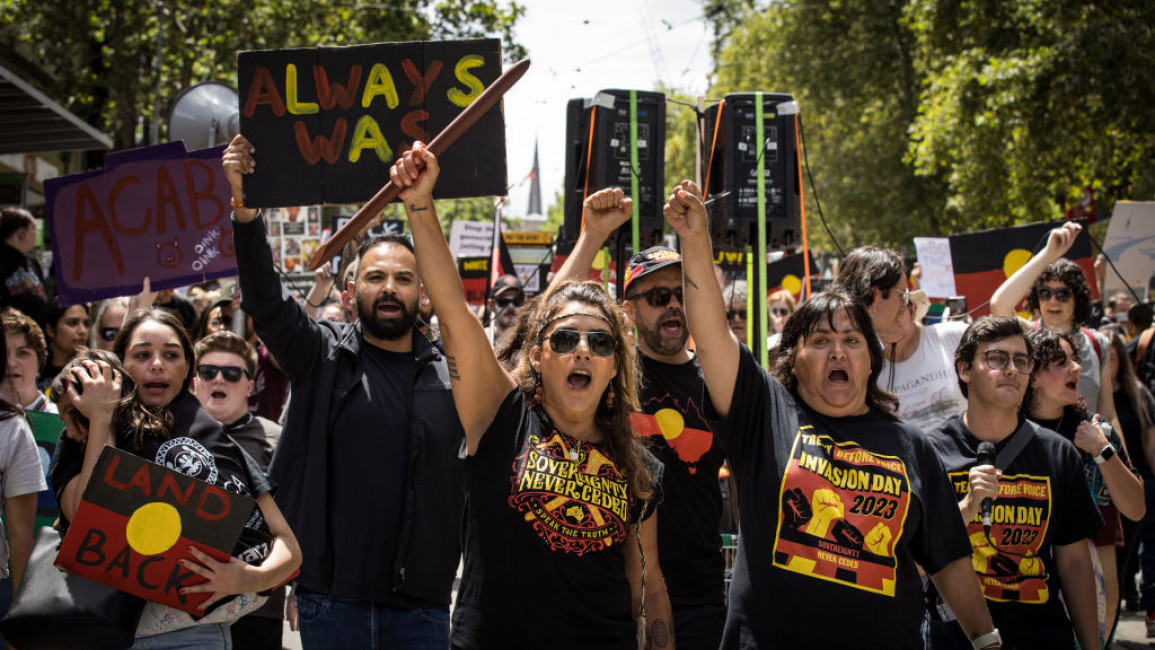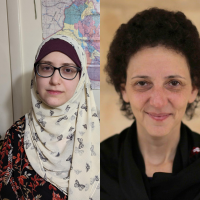
Invasion Day, not Australia Day: Why the Palestinian struggle is relevant to solidarity with First Nations peoples
In my box of childhood memorabilia is a 1988 ‘Bicentennial Memento for School Students’. I was nine years old when the government issued this heritage medallion to Australian students. My family and I were visiting my father’s family in Kuwait during the Bicentennial celebrations. We watched the news of the massive Sydney protest held on Australia Day. It didn’t make sense to me. I was too young then to realise I had a reference point to understand dispossession and land theft. Indeed, we were in Kuwait because my Palestinian family was denied the right to live on their land in Palestine.
If you had asked me then what I learned at school about Australia’s ‘founding’ history, I would have been able to tell you about life on the first fleet, the hardships convicts endured, Captain Cook’s voyages and Arthur Phillip’s arrival. The First Nations’ peoples dispossessed in these ‘grand’ adventures were absent from the triumphant and celebratory narrative I was taught at school, and certainly not part of my socialisation.
''To speak truth to power, to resist terra nullius in all its present manifestations and expressions, to properly re-name Australia Day as Invasion Day, is a threat to the white settler state. Both in Australia and occupied Palestine, naming history, refusing erasure, provokes reactionary, oppressive political violence. Palestinians and their supporters are punished for commemorating the day they lost their land. To insist that the Nakba will not be ‘deliberately silenced’ is to invoke the wrath of a racist legal system and state apparatus structured on repressing the historical record.''
The single film I recall watching first at school and then at home was a popular cartoon, Dot and the Kangaroo. The irony is not lost on me. I am Palestinian and I grew up hearing stories about dispossession, injustice, land rights. Yet my family and I watched it as just another cartoon, failing to discern the dehumanising, stereotypical framing of Aboriginal people as ‘other’, ‘menacing’ and ‘scary’ in the film.
I was an 80s child, socialised in a non-reflexive, self-idealised narrative of Australia as a trying-to-be-successful ‘multicultural’ nation which had only recently abandoned (at least legally, anyway) its racist White Australia policy.
Growing up I understood that my father had a home in Palestine which he was not allowed to return to, and that I had family in Kuwait and Jordan, who were stateless, denied the right to live in their homeland. I attended family weekend events hosted by a local Palestinian community group where I caught snatches of conversation about an intifada, about somebody called Yassir Arafat.
The young Australian Palestinian community I grew up with negotiated the challenge of trying to build a strong sense of cultural identity and collective bonds whilst also trying to build a life as new migrants in Australia. All the while they struggled with the enduring pain of having one’s heart and soul ripped into two: between the home one has been expelled from, and the new home one must try to build.
There was little understanding then of how the dispossessed were on the land of another dispossessed people. My family migrated to Australia only a few years after Aboriginal people were counted in the national census for the first time (1973). I grew up as a child at a time when the myth of terra nullius (“land belonging to no-one”) was upheld, and legal challenges to the racist settler-colonial lie were unsuccessful.
We stand up. we rise. we fight. Today we remind the colony that this land was and never will be Terra Nullius.
— Nessa Turnbull-Roberts (@TurnbullVanessa) January 25, 2023
We do it everyday.
Make no mistake.
Always was, Always will be.
See you on the streets.
For our elders, for our children!
Always was, Always will be❤️💛🖤✊🏾
My own political consciousness and activism, especially around Palestine, emerged in my teenage years. I started to understand that settler colonialism can only be challenged by recognising shared racial logics, and building movements based on solidarity. Yet there was no real popular mass social movement back then which I could refer to. These were small conversations, inspired by a teacher here, an activist there.
Later, as a university law student, I learned about the historic 1992 case brought by Eddie Koiki Mabo which resulted in the High Court of Australia overturning the legal fiction of terra nullius. I started to see connections.
Didn’t Zionists similarly justify the ethnic cleansing of Palestine based on the lie of, ‘a land without a people for a people without a land’?
For the white majority, the everyday beneficiaries of the foundational and continuing injustices upon which Australia as a white nation was built, ceding power and working against one’s privilege are never going to come instinctively. Yet it is important to understand that solidarity is a practice, not a given.
Being Palestinian doesn’t guarantee an understanding of what solidarity means. In a nation structured around a white majority, we see over and over again that among racial and ethnic minorities, even those born here, the instinct to integrate as a ‘model minority’ is seductive.
It’s the work we do to understand our identities as settlers in the context of living on stolen land that makes the difference.
For several years now, I have brought my children with me to Invasion Day rallies as I have done so this week. I make sure to embed the truth of the country’s history into their vocabulary: Invasion Day, not Australia Day. ‘Stole’ not ‘Discovered’. ‘Invaders’ and ‘colonisers’ not ‘explorers.’ I want my children to understand whose land they are on and what their responsibilities are. I want this history to become part of their taken-for-granted political and historical vernacular. I want them to understand that they cannot mourn the Palestinian Nakba (and continuing Nakbas) whilst ignoring Australia’s 26 January founding (and ongoing) catastrophe of genocide, dispossession, theft.
Indigenous people who call for the abolishment of Australia Day are routinely told to ‘get over it’; accused of fixating on the past, instead of reckoning with it.
To speak truth to power, to resist terra nullius in all its present manifestations and expressions, to properly re-name Australia Day as Invasion Day, is a threat to the white settler state. Both in Australia and occupied Palestine, naming history, refusing erasure, provokes reactionary, oppressive political violence. Palestinians and their supporters are punished for commemorating the day they lost their land. To insist that the Nakba will not be ‘deliberately silenced’ is to invoke the wrath of a racist legal system and state apparatus structured on repressing the historical record.
Settler colonies, founded on blood and illegitimacy, relentlessly pursue retrospective legitimacy only by seeking to erase the pain, histories and identity of the dispossessed. To actively celebrate and rejoice in that first violation is a power play, a reminder that domination and oppression are not past ‘anniversaries’, but ongoing punishments.
And so, when Indigenous Australians protest the celebration of their own first (and continuing) ‘Nakbas’– Invasion Day– I offer my solidarity. As a Palestinian, I will continue to do what is within my power to stand up as an ally of Aboriginal and Torres Strait Islander peoples, centring their voices and demands, educating my children and networks, and unequivocally refusing to participate in a celebration of the trauma of the owners of the land on which we are privileged to live.
Randa Abdel-Fattah is a DECRA Research Fellow in the Department of Sociology at Macquarie University researching the generational impact of the war on terror on post 9/11 youth and the award winning author of over 11 novels.
Follow her on Twitter: @RandaAFattah
Have questions or comments? Email us at: editorial-english@newarab.com
Opinions expressed in this article remain those of the author and do not necessarily represent those of The New Arab, its editorial board or staff.




